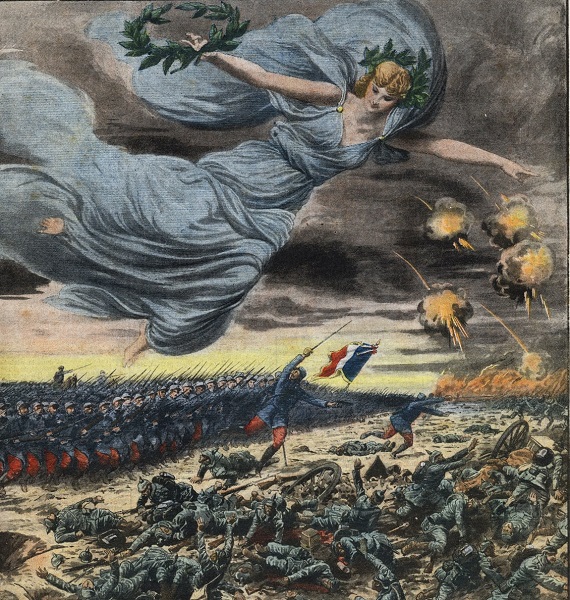● ● ●
For clarity, German units are
rendered in italics.
As with Tannenberg, legends cluster
around the First Battle of the Marne. Celebrated incidents
like the taxicabs of Paris rushing troops to the front were
magnified beyond their importance by wartime propaganda, and
the battle as a whole became known as “the Miracle of the
Marne.” The facts are more prosaic. In a remarkably
prescient prewar Cabinet paper Winston Churchill, then First
Lord of the Admiralty, forecast a forty-day campaign with a
German advance to the vicinity of Paris culminating in a
decisive battle that would check the invading armies and
throw them back. Churchill pointed out that as the Germans
advanced their front would become wider, their
communications more tenuous, the security of the area to the
rear of their front-line forces less certain. Troops would
have to be detached to mask fortresses, guard rail lines and
occupy captured cities. Casualties would further thin the
Germans’ ranks and exhaustion would reduce their battle
capacity.
But what seemed clear in the cool
shade cast by peace was less easy to perceive in the heat of
battle. As August gave way to September and the armies of
the German right wing drew closer and closer to Paris, many
leaders on the Allied side took counsel of their fears. The
French government decamped to Bordeaux, leaving Paris to its
military governor, General Joseph Gallieni, whose orders
were to place the national capital in a “state of defense.”
Gallieni, who was General Joffre’s designated successor as
commander-in-chief in case of the latter’s incapacity,
demanded three regular corps—some six divisions—to bolster
his scratch force of Territorial troops. This Joffre
refused—though later, with the Germans at the gates of the
capital, he changed his mind and placed the newly raised
Sixth Army under Gallieni’s command.
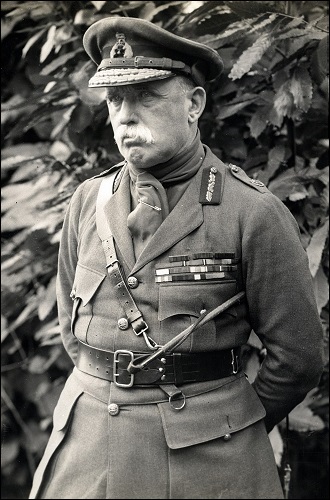
Sir John French (Imperial War
Museum)
The disastrous course of the Battle
of the Frontiers had shaken the confidence of
soldiers and civilians alike. Prominent among those
exhibiting signs of stress was the commander of the British
Expeditionary Force (BEF), Field Marshal Sir John French.
The hard-fought Battle of Mons with its many casualties had
shocked him, the Great
Retreat had depressed him, and his suspicions
about the intentions of his French allies had matured into
defeatism. Late in August he informed the British government
that he intended to take the BEF out of the line entirely,
withdrawing it to the Channel coast in anticipation of an
evacuation from France. Prime Minister Asquith and his
Cabinet colleagues were aghast. The Secretary of State for
War, Lord Kitchener, was dispatched to Paris with peremptory
orders: The BEF was to stay in the fight and conform to
Joffre’s general plan of campaign. But there was reason
enough for French's nervousness, for on the face of things
the German offensive seemed to be unfolding according to
plan. By 29 August First Army had advanced to within
15 miles of Paris and its commander, General von Kluck, was
confident of victory—his immediate opponent, the French
Fifth Army, having been badly battered.
Supposedly Kluck was under the
orders of his left-flank neighbor, General von Bülow,
commanding Second Army, this to ensure that the
advance of the right wing was properly coordinated. The
Chief of the OHL, General Helmut von Moltke, far away in
Luxembourg, had delegated command authority to Bülow in
compensation for his own inability to control the battle.
But Kluck took little account of this technicality.
Believing that one final thrust would lead to the collapse
of the French left flank and the fall of Paris, he
disregarded Bülow’s calls for support. But the advance of Second
Army had stalled out to the east of Paris, just south of
the Marne River, and Bülow was becoming concerned about the
security of his right flank. He wanted First Army to
sidestep left so as to close the gap that had opened between
the two armies. Kluck, however, remained intent on his
quarry: the tottering Fifth Army.
On 30 August, therefore, he made a
fateful decision: Seeking to turn Fifth Army’s left flank,
Kluck once more altered his line of advance. Schlieffen’s
plan had the German right wing enveloping Paris
to the north and west; Kluck now proposed to pass to the
east of Paris. And there can be little doubt that had his
ploy succeeded the French Army would have sustained a heavy
defeat, with the loss of Paris and perhaps even the loss of
the war. Nor was Kluck’s turn unwelcome to Bülow, who judged
that it would close the gap, now 30 miles wide, that so
worried him. All in all, it seemed that victory was within the Germans’
grasp.
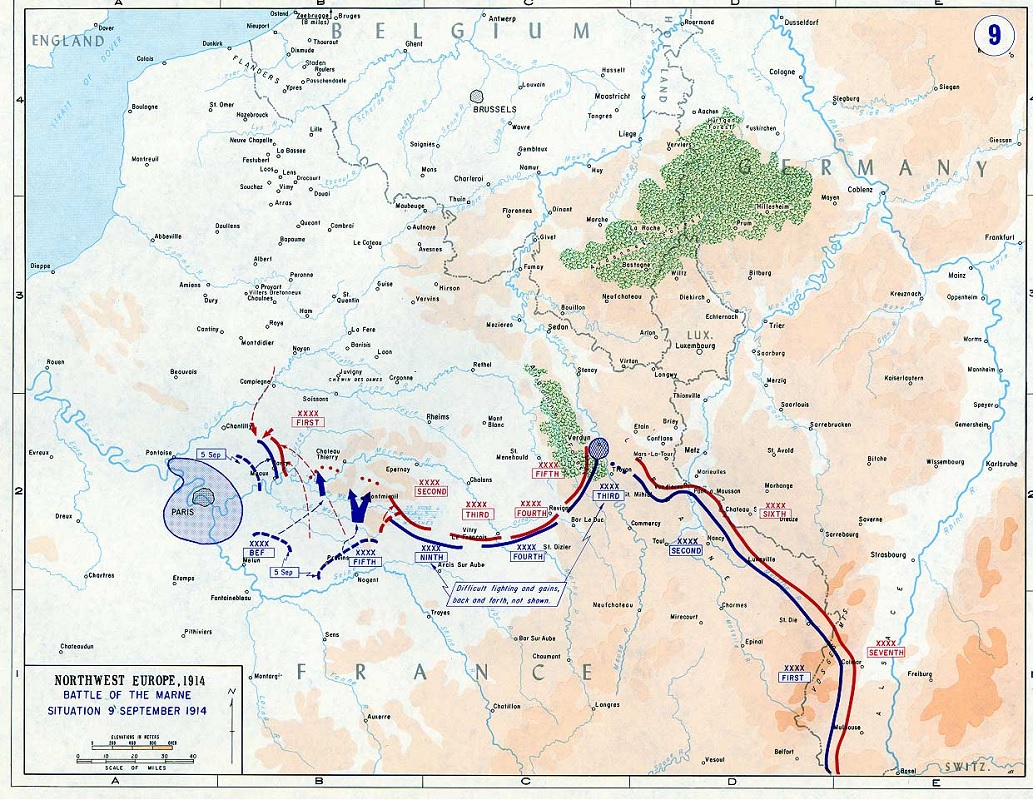
Department of History, USMA
West Point
But it was not to be. As Churchill
had foreseen, the German advance became more and more
disjointed as casualties, fatigue and the fog of war exacted
their toll. When Kluck made his turn he had no inkling of
the presence near Paris of the new Sixth Army. The French,
however, were better informed: Radio intercepts, confirmed
by air reconnaissance, had alerted Gallieni to the German
change of front. “They offer us their flank!” he exclaimed,
and with Joffre’s agreement he ordered Sixth Army to attack.
It did so on 5 September, striking at First Army’s exposed
right flank. This was the opening move of the Battle of the
Marne.
A prompt counterattack on 6
September by IV Reserve Corps, the right-flank corps
of First Army, stopped Sixth Army in its tracks and
drove it back. Kluck, now alert to the danger, turned his
army to face west, a necessary move but one that prevented
the closure of the gap between it and Second Army.
The latter was by now in a precarious position. On 8
September Joffre ordered the reinforced Fifth Army to join
the attack, striking Bülow’s right flank, driving it back
and widening the fatal gap. Into that gap marched the BEF.
Brushing aside such German cavalry patrols as they
encountered the British troops reached and crossed the
Marne, and by 10 September they held a bridgehead six miles
deep. Second Army’s flank had been turned. Farther
east, attacks by the French Fourth and Ninth Armies added to
the pressure on the German right wing.
Deepening anxiety at OHL about the
situation at the front had already led Moltke to dispatch to
the armies a staff officer, Lieutenant-Colonel Richard
Hentsch. He was given instructions to ascertain the
situation and, if necessary, to issue orders in OHL’s name.
It may seem remarkable that an officer of modest rank was
given such powers, but this was a feature of the German
general staff system. Arriving at Bülow’s headquarters on 8
September, even before the BEF had reached the Marne, he
concluded that Second Army was in danger of
encirclement, and that an immediate retreat of the entire
German right wing was necessary. Kluck, whose army was still
fighting well, protested that victory was just around the
corner but Hentsch, making use of the authority he had been
given, carried his point. Orders were issued for a general
retirement to the line of the Aisne River. Thus was the
Battle of the Marne decided in favor of the Allies.
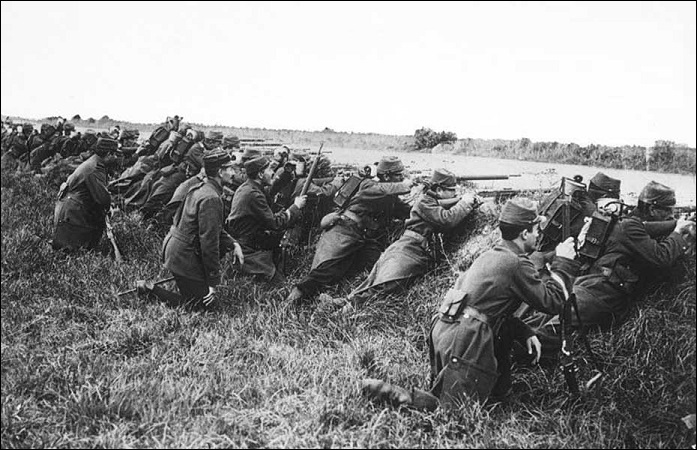
French infantry in action
during the Battle of the Marne (Musée
de l'Armée)
The German armies retreated in good
order, not too closely pursued by the French and British,
who were as tired and worn out as their opponents. On 13
September the Germans reached the Aisne and there they
established an entrenched position: the first appearance in
the West of a defensive system that would soon become
ubiquitous. The armies of the German left wing were ordered
to desist in their attacks around Verdun and give up troops
to reinforce the Aisne position.
Kluck’s turn is usually represented
as the cardinal error that ruined Schlieffen’s master plan.
But in fact the plan had already gone awry when Second
Army became stuck while First Army continued to
advance, thus opening the gap between them. Once that
happened it became impossible for Kluck, with both flanks
unprotected, to pass north and west of Paris. Somehow that
gap had to be closed, either with fresh troops or by a move
to the east on the part of First Army. Had it been
closed the Germans might still have prevailed. But the
presence of the French Sixth Army near Paris scotched that
possibility. Its attack on 5-6 September, though tactically
unsuccessful, compelled Kluck to halt his army and face
west. Thus the gap between First and Second Armies remained
open, soon to be exploited by the BEF and Fifth Army.
Lieutenant-Colonel Hentsch, who in later years was much
maligned for his role in the battle, in fact did no more
than bow to the inevitable when he ordered the retreat of
the German right wing.
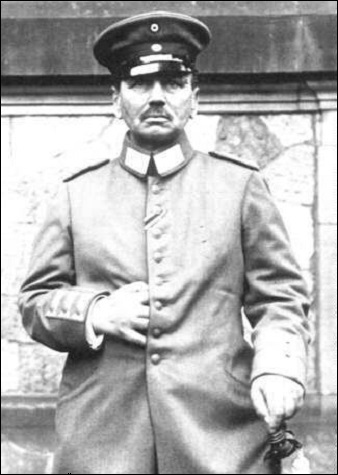
Colonel-General Alexander von
Kluck (Bundesarchiv)
The failure of the great offensive
had a shattering effect on Moltke. He is said to have
reported to the Kaiser, “Majesty, we have lost the war.”
Shortly thereafter he suffered a nervous breakdown. For fear
that the news of his collapse would depress national morale,
he was not immediately relieved as Chief of the OHL. But all
business was taken out of his hands and entrusted to his
eventual successor, General Erich von Falkenhayn, the
Prussian Minister of War. For a month the wretched Moltke
lingered on at OHL, his presence an unwelcome reminder of
the victorious hopes that had been dashed on the banks of
the Marne. Later he was given command of the Ersatzheer (Replacement
Army), responsible for mobilizing reserves, raising new
units and training conscripts. But his health continued to
deteriorate and he died in June 1916.
Thought Germany’s bid for a quick
victory had failed, the war of movement in the west was not
yet at an end. Beyond Paris the flanks of the opposing
armies remained open. It was the possibility, recognized by
both sides, that the enemy’s flank might yet be turned that
led to the misnamed Race to the Sea: a series of engagements
that extended the front from the Aisne line to the Channel
coast in Belgium. And there, around the town of Ypres, was
fought the first of those sanguinary battles by which the
Western Front acquired its sinister reputation.
